|
Collecting
Music Boxes, Coins, and More
By Q. David Bowers
|
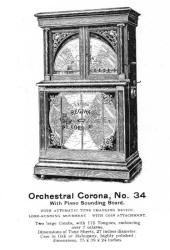
|
|
A
Regina music box that holds and
automatically changes 12 discs,
each measuring 27 inches in diameter,
as shown in a circa 1899 catalogue.
Today, these music boxes are highly
desired collectors’ items. |
Recently our
friend Marty Roenigk, who hails from Eureka Springs, Arkansas,
wrote an interesting article, “My Philosophy on Collecting
Antique Mechanical Music.” Coins were mentioned prominently.
Marty and his wife
Elise, who used to live near Hartford, Connecticut, moved to
Eureka Springs a few years ago and purchased two resort hotels
from the Victorian era—the Crescent and the Basin. The Crescent
in particular has been a well known historical stopping place
for many people and has been widely featured in the media. You
can check it out on the Internet.
While Marty and Elise “collect” hotels, they also collect
automatic musical instruments—in the form of music boxes,
coin-operated pianos, band organs, and the like. They have been
active in the field for many years. At one time Marty was
president of the Musical Box Society International, and for a
long time Elise was treasurer.
Today, along with other business enterprises, they conduct
Mechantiques, a seller of such automatic musical instruments. If
you are in the market for a Regina automatic disc-changing music
box, a classic (and we enjoy ours a lot), he has a remarkable
seven for sale, at $19,000 each.
Back to the
article, which you can read in its entirety on the Mechantiques
website. Marty related that he had been involved with music
boxes for some 40 years and had been dealing in them for over 35
years.
|
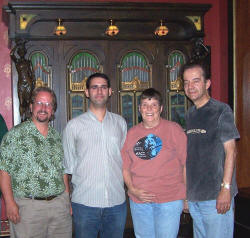
|
|
Elise
and Marty Roenigk (second from the right and right)
with numismatists Bob Evans and John Kraljevich
in the foyer of the Crescent Hotel in Eureka Springs.
The collectors were on hand to visit the Gallery Mint,
a private facility now reorganized and owned by
the Roenigks. Behind them is a coin-operated
Seeburg Style H Solo Orchestrion.
(Detail from a larger picture taken on August 20, 2006) |
Then: “Prior
to mechanical music, I was an avid collector of coins, having
compiled a pretty extensive collection of United States half
dollars.”
He went on to say that on one fine day while going to a coin
shop, he came across a disc music box. “It was so intriguing
that it kicked off a lifetime of interest in mechanical music.”
One thing led to another, he saw other instruments, read a lot,
and became deeply involved. While maintaining a casual interest
in coins, he emphasized music boxes and related things, and went
on to the accomplishments just mentioned.
He then gave some differences between collecting coins and
collecting music boxes.
He noted that coins have problems concerning counterfeiting,
such as the recent feature in Coin World about several
businesses in China turning out copies of United States coins,
nonchalantly and without any interference. Such fakes are
commonly sold in Internet auctions, antique shops, and
elsewhere, and certainly can be a threat to anyone seeking
bargains.
|
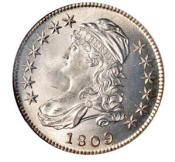
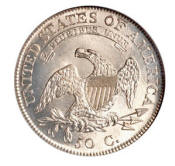
|
|
A
nice early United States
half dollar.
|
In contrast, while
music boxes can be replicated or reproduced, the word
“counterfeiting” is not appropriate, as new versions differ
slightly. Also, as Marty points out, the modern units are often
more expensive than the originals, gaining no commercial
advantage for anyone making them.
Then there is the matter of security for a collection: “It takes
a lot more time and effort to steal a few music boxes or coin
operated pianos than it does to steal a briefcase full of coins
or a pillowcase full of sterling silver.”
This is true. It would take a dedicated burglar and several
helpers a lot of time to remove a coin-operated piano from a
collection, and once done, what would he or she do with it? The
field of enthusiasts is very limited, most people know each
other, and the instrument could be quickly identified as each
has a different wood grain and certain other aspects, making
them easy to identify from photographs. Besides, a lot of work
would be involved. Some larger instruments would be completely
impossible to steal—such as a theatre pipe organ.
Another advantage of collecting music boxes, Marty says, is that
these are “far lower relative to rarity and original cost than
in almost any other field. We can buy fine antique music boxes
today for roughly the inflation adjusted original cost of that
music box. And the better pieces are exceptionally scarce, far
scarcer than the better pieces in most other collecting fields.
The rarest coins routinely sell for over $1,000,000. A Honus
Wagner baseball card can sell for $500,000. A fine vintage
Ferrari, more akin to our mechanical music, will set you back
$400,000 to $800,000 or potentially much more, and yet cannot be
considered to be rare by any classical definition. You can buy
truly exceptional antique mechanical musical instruments for
well under $50,000.”
Further from Marty, “Imagine—I believe I could put together one
of the very finest and largest truly world-class collections of
antique mechanical music for the price of just one of dozens of
paintings, classical or contemporary, selling at Sotheby’s or
Christie’s last year for more than $5,000,000 each…”
More: “Somebody said, ‘music warms the soul.’ It certainly does
something to calm me down and take me away from the problems of
the day to day world. And when I can listen to music played on
marvelous antique technology that sound exactly (assuming proper
restoration of course!) like they did when the original owner
listened to them 100 years ago, I am transported to another
time, truly ‘someplace in time.’ What a wonderful respite.” And,
in conclusion, “Is antique mechanical music a good investment?
Who knows what is a good investment today? … It doesn’t hurt to
have some tangible assets in these turbulent times.”
Your editor, as an avid collector of music boxes and coin
operated pianos, and also a lifelong devotee of coins, tokens,
medals, and paper money, was moved to send a comment to Marty
(who has been a good friend for many years). I suggested that
“there is no need to be negative on one subject to strengthen
the positive aspects of another.”
|
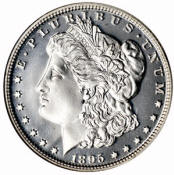
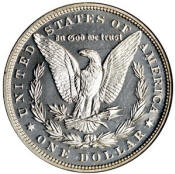
|
|
A
Proof 1895 Morgan silver
dollar—the key coin in the
1878 to 1921 Morgan
dollar series. Only 880
were struck. |
I suggested that
perhaps coins are a bit more easily graded, shipped, stored, and
understood than are music boxes and coin-operated pianos. They
are also more easily bought and sold. If someone has a Proof
1895 Morgan silver dollar in a grade such as to be worth
$50,000, it could be sent to an auction, say one of our own
sales here at Stack’s, illustrated, catalogued, and it would
appeal to many thousands of potential buyers. They would know
what the coin is, be familiar with its grade, have some idea of
market value, and would have a desire to own it. If consigned to
our next sale it would be sold within the next two or three
months, and the proceeds could be banked shortly afterwards.
In contrast, if someone had a 1895 Mermod Frčres twenty-four
inch interchangeable cylinder music box in nice condition, with
matching table, and valued about the same as the 1895 Proof
Morgan dollar, this would be more difficult to sell. It is every
bit as desirable, and the owner of the music box would
appreciate it just as much as would the owner of the silver
dollar. In fact, perhaps even more so, as the music box could
entertain family and friends with a program of melodies.
However, offered for sale, there would probably not be more than
a couple hundred people worldwide who know exactly what such a
Mermod Frčres music box is and what it is worth. And, if they
did buy it, they would have to arrange for handling and
shipping. If one were for sale in, say, Eureka Springs,
Arkansas, and someone in Zurich, Switzerland wanted to buy it,
it would require extensive customs documentation, packing and
shipping, and expense ranging into four figures. In contrast,
the Proof 1895 dollar could be shipped by Federal Express and
would arrive in a day or two.
Upon receiving such a fine music box—and this is indeed a
classic well worth owning—the owner could keep it in his or her
home, or even loan it to a museum, and would not have to worry
much about it being stolen. In contrast, very few people would
keep a Proof 1895 Morgan silver dollar on view in the living
room, and no one would put it on a stand in a museum,
unprotected, where people could pass by.
All of this said, the discussion, while interesting, may not be
particularly relevant. One could go on and on.
|
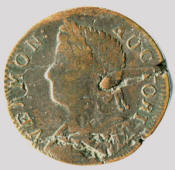
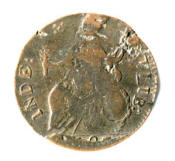
|
|
A
1787 Vermont copper coin, variety
known as Ryder-15, Draped Bust Left.
This is a rarity in the series, as the
reverse die broke after only a few had
been struck. All known examples have
significant wear. Probably, it takes a
dedicated specialist to appreciate
such a rarity, given its overall
appearance! And yet, such a coin
offered at auction would stir up a
lot of excitement.
|
In a little note
to Marty after reading his article, I said that I like music
boxes, but I also like my 1787 Ryder-15 Vermont Draped Bust
copper, although that particular item I have to keep in a bank
safe deposit box (but I do have a nice photograph of it). I also
enjoy Currier and Ives prints, some of which are in the Stack’s
office, and, for that matter, I enjoy our family alley cat (a
gift from Brent Pogue, a feral cat that was found on his ranch
in Texas, but has since become one of the sweetest animals this
side of heaven), and our Labrador Retriever.
It seems to me that collecting music boxes and collecting coins
cannot be logically compared. They are so different. Perhaps
enjoyment of ownership is a common thread, but there is not much
else.
And, they are not mutually exclusive. One can collect music
boxes and also collect coins.
I suggested that a well rounded coin collector would do well to
have a couple antique prints, possibly a music box or two,
certainly some old books, and other classic objects from
history. These contribute to intellectual inquiry and the
enjoyment of life. Similarly, someone who collects music boxes
would probably enjoy owning a Proof 1895 Morgan silver dollar,
if they could afford $50,000, or for 1/100th of that amount, or
just a few hundred dollars, a Morgan dollar struck in Carson
City. These items are infinitely interesting. Also, if one runs
out of space in collecting pianos—certainly easy to do, this is
not likely to happen when collecting coins.
No one hobby exists to the exclusion of another. All have
similar characteristics. All have differences as well. Three
years ago I went to the annual convention of the Musical Box
Society International in Orlando, Florida. A field trip was made
to see a fine collection of music boxes, coin operated pianos,
and the like (by the way, the owner was a well-known
numismatist). We all had a good time. Great camaraderie,
enjoyment, talk about the hobby, and the like.
More recently, last November, I was keynote speaker at the
Colonial Coin Collectors Club meeting in Boston, Massachusetts.
A room filled with enthusiastic numismatists listened to what I
had to say, and, in the same time frame of a couple days,
enjoyed a convention and also participated in an auction
(conducted by Chris Victor-McCawley and Bob Grellman). There was
great camaraderie, lots of talk about colonial coins, and
enthusiasm.
Except for the subject at hand, the music box enthusiasts and
numismatists were almost identical. You could switch the
participants in one convention with the other. And, I would have
no doubt that if this were done, the collectors of colonial
coins would appreciate the wonderful intricacies of music boxes
and the like, and music box collectors would certainly enjoy
learning about the historical, artistic, and other aspects of
coins. Having intellectual curiosity is a prerequisite to
enjoying the collecting of anything.
In conclusion of my message to Marty, I suggested that we all
have a challenge to maintain enthusiasm for hobbies. The
different groups, in music as well as coins, and also in other
areas, have been declining in membership. Beyond hobbies,
attendance at National Parks has dropped a lot (even before the
current economic problems). Fraternal lodges and clubs in the
United States, pubs in Great Britain, and also, are all giving
way to the ease of finding amusement on the Internet or on
computers, by staying at home, playing games, communicating with
others, all the while sitting in a chair.
And yet, those who are active in collecting hobbies and who
attend conventions, auctions, shows, and the like, continue to
enjoy themselves a lot—just like the two conventions mentioned.
They are a very nice addition to everyday life.
Perhaps we need to get some Internet people who have no
collecting hobby to learn about music boxes or coins or both! |








